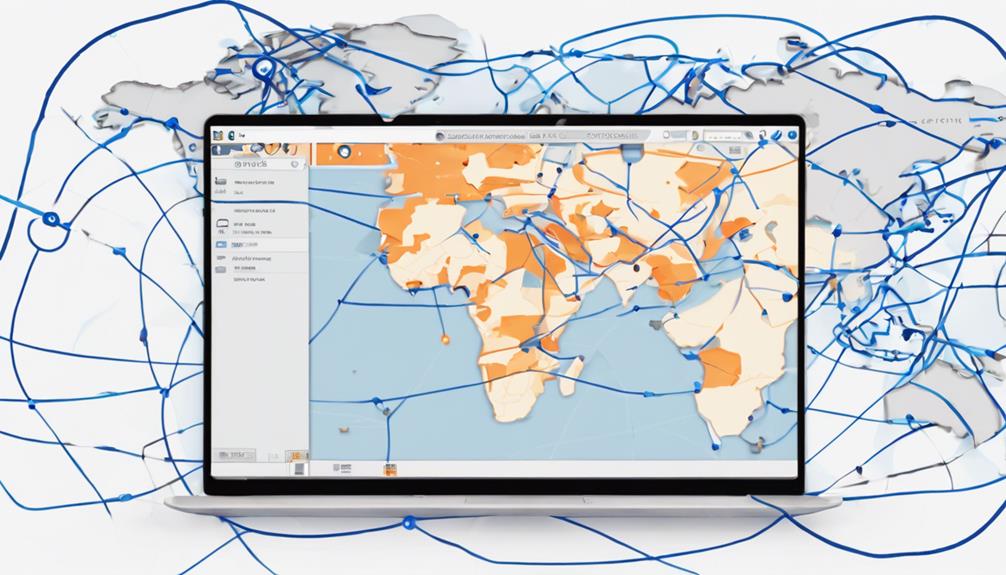While using Tor can provide some level of anonymity, it's important to understand that tracking risks still exist. ISPs and certain countries can detect Tor usage, and operational security lapses can jeopardize your anonymity. Even traces of past Tor activity can expose vulnerabilities. To enhance your security, consider combining Tor with VPNs and secure operating systems for better protection against tracking risks. Remember, staying vigilant in your online practices is key to maintaining your privacy on Tor.
Key Takeaways
- ISPs and some countries can detect Tor usage.
- Poor operational security practices can compromise anonymity.
- Combining Tor with VPNs enhances privacy and security.
- Lingering traces of past Tor activity can expose vulnerabilities.
- Using proxy chains post-Tor can boost anonymity.
Tracking Risks Associated With Tor

Tracking risks associated with Tor can expose you to potential identification and compromise of your anonymity. While Internet service providers (ISPs) and certain countries can detect Tor usage, they're unable to monitor the specific websites you visit.
However, lapses in operational security, such as inadvertently revealing personal information or using compromised devices, can jeopardize your anonymity while utilizing Tor. Several instances have demonstrated that poor operational security practices have led to the identification of users, emphasizing the vital need to maintain anonymity online.
Even if you discontinue Tor usage, the lingering traces of past Tor activity can raise suspicions and expose vulnerabilities. To bolster your security and privacy, consider combining Tor with VPNs and employing secure operating systems like Tails for enhanced protection.

2. PIA - Ton of servers world wide, but especially great in United States.***

3. NordVPN - The bigger the better! A great choice everywhere!***

*** Offers money-back guarantee. So try them risk free!
Anonymity Challenges on Tor
Exploring the domain of Tor presents a plethora of challenges when it comes to preserving anonymity. While Tor offers encryption and privacy features, there are significant anonymity challenges that users should be aware of. Operational security errors can compromise your anonymity, potentially leading to identification. ISPs can detect Tor usage, posing a risk to your privacy. To enhance anonymity, consider combining Tor with VPN services or using proxy chains. Below is a table highlighting key aspects of anonymity challenges on Tor:
| Aspect | Description |
|---|---|
| ISP Detection | ISPs can detect Tor usage, potentially compromising your anonymity. |
| Tor Exit Nodes | The use of Tor exit nodes can introduce vulnerabilities in your anonymity. |
| Combining Tor with VPN | Utilizing VPN services alongside Tor can enhance your privacy and security. |
Factors Affecting Tor User Tracking
Have you ever wondered how certain factors can influence the tracking of Tor users?
When using the Tor network, encrypting your traffic is essential to maintain anonymity. Your data passes through three nodes: entry, middle, and exit. Operational security errors can compromise your identity. Be cautious of modified Tor versions and malicious exit nodes, as they pose tracking risks.
To prevent tracking, consider combining Tor with VPNs for added security. Proxy chains, especially through countries with strict internet controls, can further enhance your anonymity post-Tor usage.
Understanding these factors can help you navigate the complexities of online privacy and security when using the Tor network.
Combating Tracking on Tor
To enhance your anonymity and protect against potential tracking risks on the Tor network, strategic measures can be implemented.
When using Tor, consider combining it with a VPN server to add an extra layer of security. This setup can help mask your web traffic from both your service provider and potential trackers.
Be cautious when sharing sensitive information over Tor, as operational security mistakes can compromise your anonymity. Additionally, be mindful of the operating systems you use for private browsing on Tor, as some may have vulnerabilities that could expose you to tracking risks.
Enhancing Security and Privacy on Tor

Enhancing security and privacy on Tor involves integrating additional encryption layers like VPNs to fortify anonymity and protect against potential tracking risks. By using Tor Browser in conjunction with a VPN, your traffic is encrypted through the Tor network and then again through the VPN, making it harder to trace back to your real IP address. This dual-layered protection offers Tor users increased security from prying eyes.
However, combining Tor and a VPN can sometimes lead to slower internet speeds due to the added encryption and rerouting of traffic. Understanding the pros and cons of using a VPN with Tor, along with best practices like utilizing the Onion Router and secure operating systems like Tails OS, is essential for maintaining robust privacy online.
Operational Security Practices for Tor Users
Effective operational security practices play a pivotal role in safeguarding the anonymity of Tor users. When using Tor Browser, ensure your personal information stays secure by following operational security practices.
Connect to the Tor network to benefit from multi-layer encryption, which helps guarantee your information reaches its final destination safely. It's essential to understand that while Tor is legal to use, being mindful of operational security practices is key to staying safe online.
Frequently Asked Questions
Can You Be Detected on Tor?
You can be detected on Tor due to distinct traffic patterns that ISPs recognize. Entities monitoring entry and exit nodes can track your usage. Inadequate operational security practices increase tracking risks, especially by countries and organizations monitoring network traffic.
Can Police Find You on Tor?
Police can locate you on Tor by monitoring entry and exit nodes. Techniques exist to deanonymize users for criminal investigations. Tor's anonymity is not foolproof against advanced tracking methods. Be cautious to avoid detection.
Is Using Tor Untraceable?
Using Tor provides strong anonymity but is not entirely untraceable. Your online activity can be detected by ISPs, but specific websites visited are not visible. Operational security is vital to avoid identification. Enhance privacy with VPNs.
Can the Government See What You Search on Tor?
While using Tor, your browsing activity is hidden from government surveillance. The government can detect your Tor usage but cannot see the specific websites you visit or track your online searches due to Tor's encryption layers.










